I breezed out to the Holmsgarth Terminal this afternoon, to pay for our trip to Duff House in June, or at least the part of it which involves sea travel between Lerwick and Aberdeen, courtesy of Northlink Ferries. For two passengers and a car, in peak season, this came to just under £500, even with my my concessions for being over 60. Mind you, we did opt for premium berths! I'm looking forward to the June excursion, and to my trip next weekend to get some more photographs of the Mearns for a reference library I'm building up as background information for an exhibition at Catterline at some as yet unfixed date in the future.
My exhibition at the Shetland Museum and Archives building finished on Monday, and I took the paintings home on Tuesday. I am grateful to Sonny Morrison for his assistance with transport and labour. I sold very little, which is scarcely surprising, given circumstances such as the time of year and the fact that I couldn't produce a fresh body of work for it, as the forthcoming Duff House event has been taking up all my available time over the past six months. On Wednesday afternoon, I reinstalled my mini-exhibition in the Lounge pub, the walls of which have been somewhat bare these last five weeks. Thanks are due here to Derek Hendry for making himself and his van available for painting transport. After I'd hung the pictures, I had a couple of pints of lager there, in the pleasant company of some friends.
The Duff House exhibition, already alluded to here, is progressing steadily. I've almost finished a picture of the Buckie seine-netter "Frigate", which will make eleven completed works. Number twelve, of the Gamrie drifter "Silver Wave", is also well advanced, with a further two works started. When, in the past, I have been discussing fishing boats with Buckie fishermen, and the name "Frigate" has come up, heads were shaken sadly - she was not a beautiful boat! Nevertheless, she deserves her place in the gallery with the rest.
I was out at Whiteness on Thursday to see my mother, who has been suffering from a cough caused by a virus. She is gradually getting better, I am glad to say, and the main purpose of my visit was to lend what assistance I could during a planned visit by the optician. She was given a thorough eye examination, and a welcome pair of new glasses are on the way.
For some time now, we have noticed a feral cat in my mother's neighbourhood. She is a dark tortoiseshell of quite ample proportions, and we were glad of her presence, as rabbits are no longer plaguing our garden plants. Whenever we attempted to get close to the cat, however, she beat a hasty retreat. So we were surprised when, all of a sudden, she began to to come up into the house windows, meowling to get in! On Thursday, I went out ot make contact with the beast, and she attacked me ferociously, drawing blood from my hand, before I hastily withdrew it, and hissing fiercely as she transferred her attack to my ankles which, however, were better protected. I managed to retreat indoors, and my sister Thelma, who is equally fond of cats, went out to see if she could fare any better, and came back similarly bloodied. Unfortunately her wound has become infected, and she has since had to have anti-biotic injections to counter this. Love of cats can be tough love!
The Grumpy Old Artist
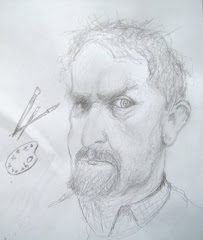
Would YOU pose for this man???
Exhibition Poster

Catterline Event, 2011
Oil Painting by Jim Tait
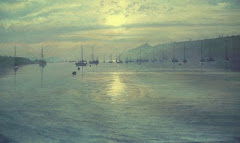
Helford River, Cornwall
Oil Painting by Jim Tait
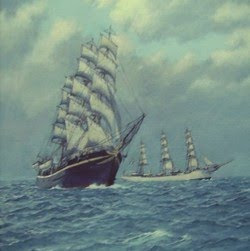
Full-riggers "Georg Stage" and "Danmark"
Other Recent Works
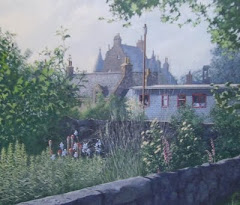
Fordyce Castle and Village

Hay's Dock, Lerwick

Shetland-model Boats at Burravoe, Yell
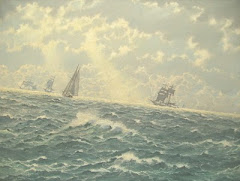
Tall Ships Seascape

The Tour Boat "Dunter III", with Gannets, off Noss
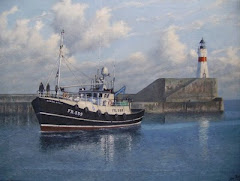
The "Karen Ann II" entering Fraserburgh harbour
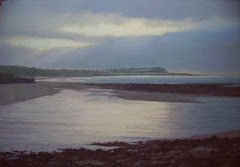
Summer Evening, Boyndie Bay
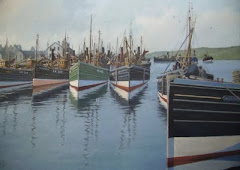
1930s Lerwick Harbour

Johnshaven Harbour
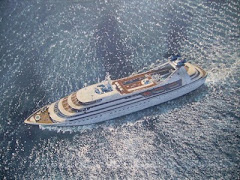
"Seabourn Legend"
Greeting Cards!

Now Available in Packs of Five or in Assorted Sets of Four
Sunday, 22 March 2009
WHAT ENLIGHTENED TIMES?
I am a fan of BBC7. Part of my weekday morning routine is to listen, at eight o'clock, to the vintage comedy output. I titter at the surreal comedy of the Goons on Monday, the navigational errors of the Navy Lark on Tuesday, the incompetent blathering and bumbling of Tony Hancock and company on Wednesday, Al Read's monstrous monologues on Thursday and, in my opinion, the funniest of them all, Round the Horne, on Friday.
So, on Friday morning, as the hour approached to hear the wit and banter of Messrs Horne, Paddick and Williams, and Ms Marsden, I heard the female announcer introducing this week's offering with an apology for the use of the word "faggot" in the broadcast, which had been first aired in 1965, before "these enlightened times".
Enlightened times? What? I almost fell off my chair laughing before Douglas Smith had even introduced the star of the show! The last occasion when the times were as enlightened was during the Dark Ages. Communist Russia and Nazi Germany failed to produce a society as unenlightened as that of today's Britain. And, tragically, the whole population has quietly acquiesced in its unenlightenment.
Various factors have militated together to produce this tragedy, one of which is rabid political correctness, which has insinuated an element of fear and confusion into our use of language. An Orwellian "thought police" has emanated from somewhere to further the interests of powerful lobbies, such as that of the gay, feminist and racial equality movements, to name but three. I do not dispute the need for equality for all strands of society, but I also grieve over the fact that, when coupled with other elements, it is reducing our language into a bland colourless nonentity. The other elements include the national addiction to mobile phone technology with its "language" of abbreviation, a whole raft of "corporate-speak", an education system which is producing a generation of school-leavers unable to read, write or perform simple calculations (not to mention complete ignorance of geography or history), and university graduates with the equivalent spelling standards of the average twelve-year-old of two generations ago. Neither do the idiotic edicts, emanating from the cumbersome and undemocratic European Union Bureacracy, contribute anything towards enlightenment.
As, politically, we stumble towards an Orwellian "Eurasia", individual thought and behaviour is discouraged in a mannner ably predicted in 1932 by Aldous Huxley in "Brave New World". I'm glad, as an artist, that I do not have black on my palette. A time is coming when its sale will be regulated, as will my artistic output. And this blog will be censored.
The country, which produced Newton, Byron, Shakespeare, Brunel, Darwin and Churchill, is now producing a generation of bumpkins, devoid of basic intelligence (not to mention humour!), fed on the Soma of 24-hour-a-day televised football, scarcely able to tie their shoelaces (and being encouraged by commercial interests to sue someone if they trip and fall). And, presumably, this is what our lords and masters in government wish to happen.
And the greatest tragedy of all is that the announcer on BBC7 is convinced that these are enlightened times.
So, on Friday morning, as the hour approached to hear the wit and banter of Messrs Horne, Paddick and Williams, and Ms Marsden, I heard the female announcer introducing this week's offering with an apology for the use of the word "faggot" in the broadcast, which had been first aired in 1965, before "these enlightened times".
Enlightened times? What? I almost fell off my chair laughing before Douglas Smith had even introduced the star of the show! The last occasion when the times were as enlightened was during the Dark Ages. Communist Russia and Nazi Germany failed to produce a society as unenlightened as that of today's Britain. And, tragically, the whole population has quietly acquiesced in its unenlightenment.
Various factors have militated together to produce this tragedy, one of which is rabid political correctness, which has insinuated an element of fear and confusion into our use of language. An Orwellian "thought police" has emanated from somewhere to further the interests of powerful lobbies, such as that of the gay, feminist and racial equality movements, to name but three. I do not dispute the need for equality for all strands of society, but I also grieve over the fact that, when coupled with other elements, it is reducing our language into a bland colourless nonentity. The other elements include the national addiction to mobile phone technology with its "language" of abbreviation, a whole raft of "corporate-speak", an education system which is producing a generation of school-leavers unable to read, write or perform simple calculations (not to mention complete ignorance of geography or history), and university graduates with the equivalent spelling standards of the average twelve-year-old of two generations ago. Neither do the idiotic edicts, emanating from the cumbersome and undemocratic European Union Bureacracy, contribute anything towards enlightenment.
As, politically, we stumble towards an Orwellian "Eurasia", individual thought and behaviour is discouraged in a mannner ably predicted in 1932 by Aldous Huxley in "Brave New World". I'm glad, as an artist, that I do not have black on my palette. A time is coming when its sale will be regulated, as will my artistic output. And this blog will be censored.
The country, which produced Newton, Byron, Shakespeare, Brunel, Darwin and Churchill, is now producing a generation of bumpkins, devoid of basic intelligence (not to mention humour!), fed on the Soma of 24-hour-a-day televised football, scarcely able to tie their shoelaces (and being encouraged by commercial interests to sue someone if they trip and fall). And, presumably, this is what our lords and masters in government wish to happen.
And the greatest tragedy of all is that the announcer on BBC7 is convinced that these are enlightened times.
Sunday, 15 March 2009
EGGS, LOAF AND SOUP!
Let's hear it for my neighbours Alex and Greta! Their daughter and son-in-law's hens have been hyperlaying and free-ranging all over north Bressay, so I received a present of eggs from them, for which I am very grateful. They are also keen anglers, and they use me as a cat when they find themselves with a few trout to spare. On the strength of the egg bonanza, I baked a cinnamon and raisin loaf on Wednesday evening, the first time my fingers have been self-raising-floury for a long time. Earlier that day, my sister accepted my invitation to partake of some of my scotch broth, so the Tait Gallery catering division was in full swing on March 11th.
I visited my mother on Friday, as usual. She has been feeling poorly of late, having been affected by the cough virus which has been doing the rounds up here since Up-Helly-A' (amazing how many contagious ailments seem to stem from that date every year!). I hope I cheered her up a bit, frying some fish for lunch and bringing her the latest email news from my sister in Saudi Arabia. This included a sequence of photographs, taken from a 20th storey window, of a sandstorm over Riyadh - I wouldn't like to be caught out in one of those! Anyway, I think my mother is on the mend, which is the best news possible as far as I am concerned.
I visited my mother on Friday, as usual. She has been feeling poorly of late, having been affected by the cough virus which has been doing the rounds up here since Up-Helly-A' (amazing how many contagious ailments seem to stem from that date every year!). I hope I cheered her up a bit, frying some fish for lunch and bringing her the latest email news from my sister in Saudi Arabia. This included a sequence of photographs, taken from a 20th storey window, of a sandstorm over Riyadh - I wouldn't like to be caught out in one of those! Anyway, I think my mother is on the mend, which is the best news possible as far as I am concerned.
DOOMED!
The exhibition of my paintings, which finishes tomorrow in Shetland Museum, was doomed from the start. I had to incorporate their commission, of 20% + VAT, into my prices, which made the works too expensive for canny Shetland buyers, and the time of year was hopeless. Most Shetlanders who like Jim Tait paintings already have one, and there are few visitors to the islands this time of year.
On a more cheerful note, another commission arrived this week. It is from a regular client, a Swedish yachtsman and businessman, whose patronage I have enjoyed since the mid-90s. I have now completed 10 of the works for the Duff House exhibition in June, and I am working on the next three, as well as another commission of an old Aberdeen steam trawler. I'm looking forward to being able to display some of my recent works on this blog, when my new broadband connection is up and running, which may be this week. You never know - I've only been waiting 3 months for it now!
On a more cheerful note, another commission arrived this week. It is from a regular client, a Swedish yachtsman and businessman, whose patronage I have enjoyed since the mid-90s. I have now completed 10 of the works for the Duff House exhibition in June, and I am working on the next three, as well as another commission of an old Aberdeen steam trawler. I'm looking forward to being able to display some of my recent works on this blog, when my new broadband connection is up and running, which may be this week. You never know - I've only been waiting 3 months for it now!
THe "HESPERUS" PART 1
I was about twelve when my father bought our first boat. She was an elderly Shetland model open boat of eleven feet keel and about eighteen feet overall, green-painted, with a maroon bottom and inside. Dad chose, for her first "noost", the little round bay at Wester Quarff, and no doubt had in mind the sheltered waters of Clift Sound for our first family outings. However, from the moment she was launched, it became clear that our first voyage was going to be a short one. She leaked like a sieve. With Dad rowing frantically and my brother, sister and I bailing out water industriously, we managed to beach her safely again. The boat was duly put back on her trailer and towed back to our house, where she remained for the rest of that year, a restoration project for my father with what little help he could cajole from the rest of us.
From that time onwards, she was known as the "Hesperus", after the wreck in Henry Wadsworth Longfellow's poem. Dad used an unlikely combination of fibreglass and hardboard to make repairs to her bottom boards and, the following year, now painted white, with a green bottom and cream inside, she was launched again, this time at Clousta on the west side of Shetland. In addition to the repairs to the hull, Dad, clever man that he was, had fixed up a mounting for an outboard motor on the stern, and he had required a Seagull 40+ to propel her along at a steady 5 knots. He had also acquired a mast, boom and standing lug sail, red in colour, to take advantage of any favourable winds we might encounter on our trips. On the shore side of things, an old mangle had, by this time, been commandeered into service as a winch for hauling the boat up. One of its rollers had been removed for this purpose, a hole had been dug for its foundation, and boulders had been piled in to secure it in place during hauling operations. A handle, secured in place with a nail through a hole in the end of the roller, fitted like a sprocket to gear the thing, so that it could be operated by even a weakling like me. My father could do wonderful things with rope, and a couple of blocks and tackle geared the thing down even further.
Many are the trips we made. From Clousta, we sailed and motored out to the fishing grounds out past the cliffs of "da Neean", where we caught a few whiting, haddock and, alas, lots of "Blinnd hoes", as the dogfish is known in Shetland. These were known as a complete pest, dangerous to handle, as they had a poisonous spike, which could cause endless suffering to anyone unfortunate enough to fall foul of it. They are marketed in mainland British restaurants as rock salmon, but to us they had no culinary value, and were thrown back into the sea.
We also explored a great deal around the area, engaging in another of our favourite pastimes of beachcombing. Buoys and floats discarded or lost from fishing boats, bits of wood, rope and net were all collected from beaches around the large, sprawling, and now uninhabited, island of Vementry and the smaller isles of Gruna and Linga. A favourite beach was Suderavoe on Vementry, where we would often brew up and have a picnic. On one occasion we motored further east, across the Swarbacks Minn, to Muckle Roe, where we discovered a sheltered lagoon, full of rocks which took a bit of negotiating and around which shags were diving. We also found a little crevice in the rocky shoreline, shaped almost as if it was a dock specifically made for our boat, where we could step ashore and explore the area. Plants, which I'd never seen growing wild anywhere else, grew in profusion over the rocky ground. I felt a real sense of enchantment about this place, and attempted later to capture the essence of it on canvas (by now, I had discovered the joys of oil painting).
Thus passed the first of many happy Hesperus summers. At the end of it, the boat was put back on her trailer and towed back home to Sandwick, which is towards the south end of Shetland mainland. There she was cleaned and given a lick of paint over the winter months, in preparation for another season of adventure. More of that later.
From that time onwards, she was known as the "Hesperus", after the wreck in Henry Wadsworth Longfellow's poem. Dad used an unlikely combination of fibreglass and hardboard to make repairs to her bottom boards and, the following year, now painted white, with a green bottom and cream inside, she was launched again, this time at Clousta on the west side of Shetland. In addition to the repairs to the hull, Dad, clever man that he was, had fixed up a mounting for an outboard motor on the stern, and he had required a Seagull 40+ to propel her along at a steady 5 knots. He had also acquired a mast, boom and standing lug sail, red in colour, to take advantage of any favourable winds we might encounter on our trips. On the shore side of things, an old mangle had, by this time, been commandeered into service as a winch for hauling the boat up. One of its rollers had been removed for this purpose, a hole had been dug for its foundation, and boulders had been piled in to secure it in place during hauling operations. A handle, secured in place with a nail through a hole in the end of the roller, fitted like a sprocket to gear the thing, so that it could be operated by even a weakling like me. My father could do wonderful things with rope, and a couple of blocks and tackle geared the thing down even further.
Many are the trips we made. From Clousta, we sailed and motored out to the fishing grounds out past the cliffs of "da Neean", where we caught a few whiting, haddock and, alas, lots of "Blinnd hoes", as the dogfish is known in Shetland. These were known as a complete pest, dangerous to handle, as they had a poisonous spike, which could cause endless suffering to anyone unfortunate enough to fall foul of it. They are marketed in mainland British restaurants as rock salmon, but to us they had no culinary value, and were thrown back into the sea.
We also explored a great deal around the area, engaging in another of our favourite pastimes of beachcombing. Buoys and floats discarded or lost from fishing boats, bits of wood, rope and net were all collected from beaches around the large, sprawling, and now uninhabited, island of Vementry and the smaller isles of Gruna and Linga. A favourite beach was Suderavoe on Vementry, where we would often brew up and have a picnic. On one occasion we motored further east, across the Swarbacks Minn, to Muckle Roe, where we discovered a sheltered lagoon, full of rocks which took a bit of negotiating and around which shags were diving. We also found a little crevice in the rocky shoreline, shaped almost as if it was a dock specifically made for our boat, where we could step ashore and explore the area. Plants, which I'd never seen growing wild anywhere else, grew in profusion over the rocky ground. I felt a real sense of enchantment about this place, and attempted later to capture the essence of it on canvas (by now, I had discovered the joys of oil painting).
Thus passed the first of many happy Hesperus summers. At the end of it, the boat was put back on her trailer and towed back home to Sandwick, which is towards the south end of Shetland mainland. There she was cleaned and given a lick of paint over the winter months, in preparation for another season of adventure. More of that later.
Sunday, 8 March 2009
SILLICKS AND RANNS
"Sillick" is the traditional Shetland dialect name for the young of the coalfish. These small fish are abundant in the waters around the foreshore here, and are delicious fried whole in oatmeal, having been caught by rod and line from piers and rocks around the coastline. Sadly the word, along with a great deal of our language, is fast disappearing from local common parlance.
I cracked what I believed to be an enormously funny joke in a Lerwick chip-shop one evening. No doubt fuelled by a few noggins of Old Peculiar, and having observed that the fish in the shop's display unit were very small, I suggested to the girl behind the counter that they were sillicks. "I'll have sillick an' chips, please!" I ventured. Realising that what I'd just said sounded like "silicon chips", I laughed uproariously at my inadvertent play on words. But it was completely lost on the assistant and the group of stony-faced young girls sitting in the window. They had obviously never heard of sillicks.
Another Shetland delicacy is "ranns" (or "rawns", depending on which locality the speaker comes from). These are the roe of fish such as cod or haddock, which are a delicious supplement to the late winter diet. They are normally boiled in lightly salted water first, and can be eaten like that, or refrigerated and fried in breadcrumbs for a tasty and nutritional meal at a later date. Generations of Shetlanders have relished this traditional fare, which only used a tiny proportion of the spawning stock of the species, never threatening the future abundance of the fish. Regrettably the current politically pot-noodled generation of islanders do not seem to be acquiring this taste. On Radio Shetland's "Clear the Air" slot last Wednesday evening, one contributor expressed his or her horror at seeing ranns displayed on a local fishmonger's slab, and confidently forecast doom and destruction for fish stocks as a necessary result of this. Of course, the truth behind this is that fishermen are perceived as villains in some people's eyes, blinkered as they have been by the propaganda of certain quasi-scientific organisations.
While I almost wet myself laughing at this twaddle coming over the airwaves, the serious issue for me is that many Shetland traditions are dying out. The fact is that they have little place in today's centrally-heated, microwaved, vac-packed and instantly gratified society. No-one in his or her right mind would wish to return to the time from which these traditions hail, when each day followed the one before in an unremitting litany of back-breaking toil, just to put food on the table, fuel on the fire and clean clothes on the back. I am old enough to remember the sense of community which attended those times, however, and the sights, smells and tastes of these days will always haunt my senses pleasantly.
I cracked what I believed to be an enormously funny joke in a Lerwick chip-shop one evening. No doubt fuelled by a few noggins of Old Peculiar, and having observed that the fish in the shop's display unit were very small, I suggested to the girl behind the counter that they were sillicks. "I'll have sillick an' chips, please!" I ventured. Realising that what I'd just said sounded like "silicon chips", I laughed uproariously at my inadvertent play on words. But it was completely lost on the assistant and the group of stony-faced young girls sitting in the window. They had obviously never heard of sillicks.
Another Shetland delicacy is "ranns" (or "rawns", depending on which locality the speaker comes from). These are the roe of fish such as cod or haddock, which are a delicious supplement to the late winter diet. They are normally boiled in lightly salted water first, and can be eaten like that, or refrigerated and fried in breadcrumbs for a tasty and nutritional meal at a later date. Generations of Shetlanders have relished this traditional fare, which only used a tiny proportion of the spawning stock of the species, never threatening the future abundance of the fish. Regrettably the current politically pot-noodled generation of islanders do not seem to be acquiring this taste. On Radio Shetland's "Clear the Air" slot last Wednesday evening, one contributor expressed his or her horror at seeing ranns displayed on a local fishmonger's slab, and confidently forecast doom and destruction for fish stocks as a necessary result of this. Of course, the truth behind this is that fishermen are perceived as villains in some people's eyes, blinkered as they have been by the propaganda of certain quasi-scientific organisations.
While I almost wet myself laughing at this twaddle coming over the airwaves, the serious issue for me is that many Shetland traditions are dying out. The fact is that they have little place in today's centrally-heated, microwaved, vac-packed and instantly gratified society. No-one in his or her right mind would wish to return to the time from which these traditions hail, when each day followed the one before in an unremitting litany of back-breaking toil, just to put food on the table, fuel on the fire and clean clothes on the back. I am old enough to remember the sense of community which attended those times, however, and the sights, smells and tastes of these days will always haunt my senses pleasantly.
TEMPESTUOUS
My second storey flat is shaking in storm force winds. The windows and doors are rattling, as I look out over Breiwick Bay, where streaks of spindrift are lining the sea in grey and white. Two trawlers, their crews no doubt relieved at the imminent prospect of a steady deck under their feet, are battling their way through the last mile of their journey from distant fishing grounds to the shelter of Lerwick harbour.
Talking of trawlers, this week a friend commissioned a painting of the "Doreen Johnston, a steam trawler built on the Clyde in 1919. I remember her, in her last years in the late 1960s, as the "George R Wood", when she had been converted into an oil-burner. Her tall smokestack had been sacrificed to her new propulsion system, and she looked rather incongruous, but she kept on fishing for a decade after most of her contemporaries had been scrapped.
I am now halfway towards my target number of paintings for the Duff House exhibition in June. This means that I am slightly behind schedule, but, as the daylight lengthens, I hope to increase my workrate. By the time June arrives, I think I will be rather weary of painting historical fishing vessels. For my next exhibition therafter, my feet will be firmly on dry land.
Talking of trawlers, this week a friend commissioned a painting of the "Doreen Johnston, a steam trawler built on the Clyde in 1919. I remember her, in her last years in the late 1960s, as the "George R Wood", when she had been converted into an oil-burner. Her tall smokestack had been sacrificed to her new propulsion system, and she looked rather incongruous, but she kept on fishing for a decade after most of her contemporaries had been scrapped.
I am now halfway towards my target number of paintings for the Duff House exhibition in June. This means that I am slightly behind schedule, but, as the daylight lengthens, I hope to increase my workrate. By the time June arrives, I think I will be rather weary of painting historical fishing vessels. For my next exhibition therafter, my feet will be firmly on dry land.
Sunday, 1 March 2009
RETIRED AMATEURS
Retired Duo's Displays Show The Many Faces Of Amateur Painting
So expectorated the headline in "The Shetland Times" on Friday 27th February 2009. Underneath it was a critique, by Peter Davis, of the current exhibition in Shetland Museum, by Bobby Robertson and myself.
There was a sub-heading, underneath the headline, which stated:- "Classic Tait theme of loan boat in heavy seas". What, in heaven's name, is a loan boat - the marine equivalent of the gravy train? I know that many fishing vessels have been purchased with assistance from banks, and that many fishermen have seen loan sharks lurking in the depths, but this is a presumptive statement, against which I must protest.
Visions are entering my tortured imagination of a bank manager donning his stetson and mask, as he mounts his white charger and sets off into the sunset, with his faithful redskin sidekick Tonto. As the strains of the William Tell Overture ring out, his adoring public realise, with sadness, that another episode of The Loan Ranger has come to an end.
A hard-up but hopeful Laurel and Hardy are on the trail of the loansome pine, and Robert Duvall, as Gus, is eagerly pursuing the Loansome Dove, in the hope that it lays a golden egg or two. An impecunious Elvis approaches Priscilla hopefully, singing, "My dear, are you loansome tonight?" These images are crying out for artistic impression from me.
"Lord, it's sad to be a loan.
Help me make it through the night"
wept Kris Kristofferson, and Gladys Knight plaintively echoed the privation.
Mr Davis is an artist of repute and talent, who nevertheless should stand a bit closer to his dictionary when penning his reviews. In this instance, the spell-checker on his computer would have been of little use. Had he consulted his local directory, he would have also realised that I am neither retired nor amateur, whatever his opinion may be of my artwork. In July, I will never see sixty again, but I have been in full-time self-employment as an artist for five years, and will continue to be so for as long as I can. Things are difficult at the moment, but better times are ahead - I can feel it in my creative water.
So expectorated the headline in "The Shetland Times" on Friday 27th February 2009. Underneath it was a critique, by Peter Davis, of the current exhibition in Shetland Museum, by Bobby Robertson and myself.
There was a sub-heading, underneath the headline, which stated:- "Classic Tait theme of loan boat in heavy seas". What, in heaven's name, is a loan boat - the marine equivalent of the gravy train? I know that many fishing vessels have been purchased with assistance from banks, and that many fishermen have seen loan sharks lurking in the depths, but this is a presumptive statement, against which I must protest.
Visions are entering my tortured imagination of a bank manager donning his stetson and mask, as he mounts his white charger and sets off into the sunset, with his faithful redskin sidekick Tonto. As the strains of the William Tell Overture ring out, his adoring public realise, with sadness, that another episode of The Loan Ranger has come to an end.
A hard-up but hopeful Laurel and Hardy are on the trail of the loansome pine, and Robert Duvall, as Gus, is eagerly pursuing the Loansome Dove, in the hope that it lays a golden egg or two. An impecunious Elvis approaches Priscilla hopefully, singing, "My dear, are you loansome tonight?" These images are crying out for artistic impression from me.
"Lord, it's sad to be a loan.
Help me make it through the night"
wept Kris Kristofferson, and Gladys Knight plaintively echoed the privation.
Mr Davis is an artist of repute and talent, who nevertheless should stand a bit closer to his dictionary when penning his reviews. In this instance, the spell-checker on his computer would have been of little use. Had he consulted his local directory, he would have also realised that I am neither retired nor amateur, whatever his opinion may be of my artwork. In July, I will never see sixty again, but I have been in full-time self-employment as an artist for five years, and will continue to be so for as long as I can. Things are difficult at the moment, but better times are ahead - I can feel it in my creative water.
Subscribe to:
Comments (Atom)








